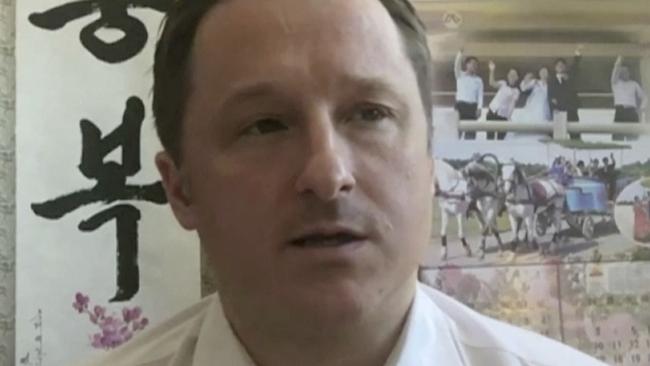China warns foreign businesses after arresting second Canadian
China has detained a second Canadian citizen this week, warning that it is prepared to enforce strict new laws.

Chinese officials have confirmed they had arrested two Canadians in China on suspicion of “engaging in activities endangering national security”.
Speaking at a press conference in Beijing last night, Chinese Foreign Ministry spokesman Lu Kang said the two cases were now under investigation.
He said the Canadian embassy had been informed of the arrests of former diplomat Michael Kovrig and China-based North Korean expert Michael Spavor, and the Canadians’ “legitimate rights and interests were being safeguarded”.
The arrests came as China said it was prepared to enforce strict new laws under which foreigners could be arrested if they visited the country working for foreign not-for-profit groups not legally registered in the country.
Mr Spavor, based at Dandong near the North Korean border, runs cultural exchanges with North Korea and was instrumental in organising a visit to the country by US basketballer Dennis Rodman to Pyongyang in 2013. He is a well-known North Korea watcher and founder of the not-for-profit Paektu Cultural Exchange who has visited North Korea many times.
Mr Spavor met North Korean leader Kim Jong-un in October last year and was a regular poster of his views and visits on social media, including his belief that business opportunities with the country would open once sanctions were lifted.
His arrest follows Monday night’s detention of former Canadian diplomat Mr Kovrig, who was visiting Beijing as part of his work for the Belgium-based non-profit organisation the International Crisis Group.
While no specific details have been given on the reason for Mr Kovrig’s arrest, Canadian authorities are concerned both arrests could be in retaliation for the arrest of Huawei’s chief financial officer Meng Wanzhou on December 1 on the request of the US Department of Justice, which claims she helped violate US sanctions against doing business with Iran.
Ms Meng was released on bail by a court in Vancouver on Tuesday — pending a new court hearing in early February — but there is increasing concern that Canadians in China may be vulnerable to detention if they are seen as violating Chinese laws in any way.
Canadian Foreign Minister Chrystia Freeland said Canada was “deeply concerned” about Mr Kovrig’s arrest. Its Foreign Affairs Ministry said it was “working hard” to determine the whereabouts of Mr Spavor, who had contacted Canadian authorities saying he had been questioned in China. They have not been able to make contact with him since.
Mr Lu this week said he did not have any details of the reasons for Mr Kovrig’s arrest, and he warned that, under laws introduced in China in 2016, foreign charities and non-government organisations needed to be registered with the government if their employees were doing any work in the country.
Mr Lu said the ICG had not taken any steps to be legally registered in China.
“If the ICG claims that this person was conducting activities on its behalf in China … then its staff carrying out activities in China violates the law of China on the administration of activities of non-government organisations in China,” he said.
“We welcome foreign travellers, but if they engage in activities which clearly violate Chinese laws, then it is totally another story.”
China has lashed out at Canada’s detention of Ms Meng as she transited through Vancouver airport from Hong Kong on her way to Mexico, calling it “vile” and vowing that Canada would face “serious consequences” if she was not released.
Her release on bail has helped to temporarily ease tensions but there is increasing concern that China could focus its anger at Canada for the businesswoman’s detention while it resumes negotiations with the US with the goal of having a new trade deal by March 1.
Washington has announced that China plans to cut tariffs on imports of US cars, from 40 per cent to 15 per cent, and make large purchases of soybeans from the US, although few details have been released publicly on any such measures in China.



